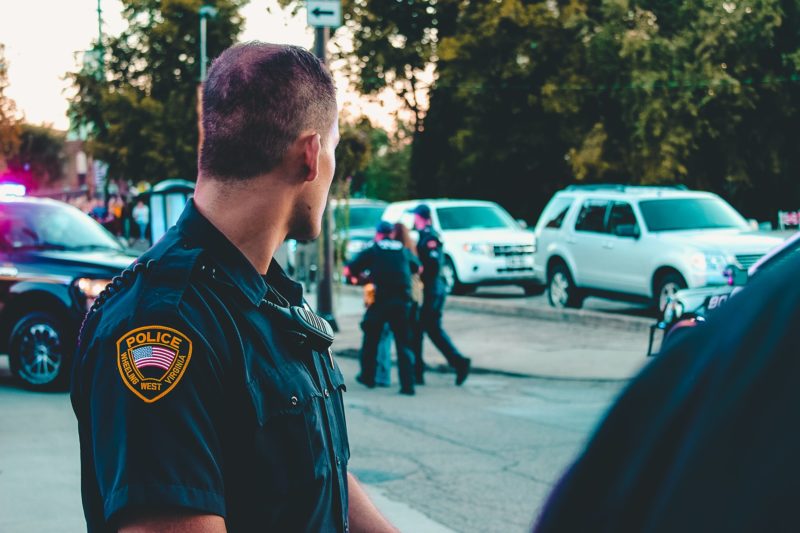Key Information:
- A bachelor’s degree in corrections can enhance career prospects within law enforcement, particularly in supervisory roles within correctional facilities.
- Both on-campus and online programs are available, offering flexibility for working professionals.
- The curriculum covers important aspects of the criminal justice system and prepares students for specific challenges in corrections.
Before entering the field of law enforcement, student can consider a range of careers. One type of degree prospect is a bachelor’s degree in corrections. However, before pursuing a job as a correctional officer, the prospective student should explore the advantages and disadvantages of the position.
Do I Need a Degree for a Corrections Career?
Corrections degrees are created to help those who want to advance in their law enforcement careers. Bachelor degree seekers for corrections are usually already positioned in the field. However, a student can also choose to enter an undergraduate degree for corrections without any previous law enforcement experience. If a corrections degree is not offered by the four-year college, then another option could be to major in criminal justice and specialization in corrections. Additionally, corrections may be offered as a minor.
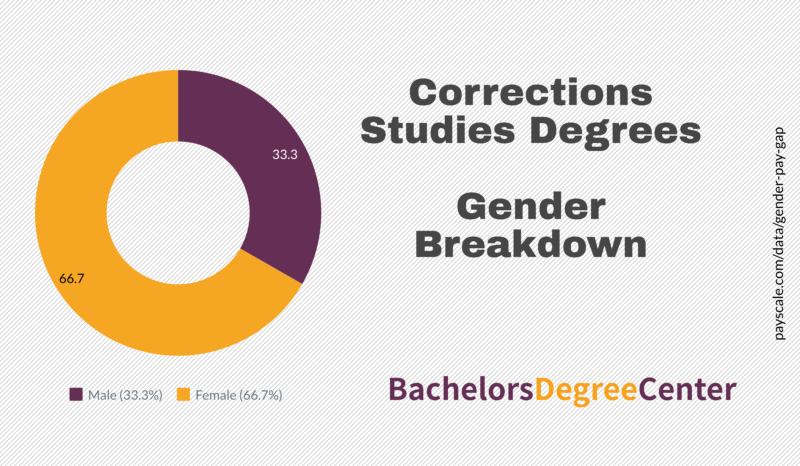
Corrections degrees can be pursued on campus or through an online program. Prospective students should compare both types to see what types of courses are offered and how flexible the schedule may be. If working, online corrections degrees may be preferential. Graduation credits are typically the same, but the online degree may be finished at a faster rate. Also, an online corrections degree program may accept work experience in the field toward credit requirements.
Corrections degrees provide multiple career pathways. However, many who earn a degree will decide to work within the prison system. Two main tracks for corrections are adult corrections and juvenile corrections. Those who are novices in the law enforcement field should consider what type of duties are associated with those who gain employment in corrections. In both settings, a correctional officer is expected to supervise inmates and keep everyone safe within the facility. Correctional officers are present throughout the day, including when the inmates are scheduled for meals and recreational activities. Juveniles have additional protections in place when compared to adult inmates. On-the-job training is an important part of working in corrections to confirm that staff doesn’t violate the rights of the prisoners. Supervisors within correctional facilities are typically in charge of training for officers and confirming that the officers are following the correct protocol.
Common questions for law enforcement degree students:
What are correctional officers?
The role of a correctional officer is to provide security within a prison. Correctional officers work within local, state, and federal penitentiaries. Correctional officers must perform searches on prisoners and within cells. They also ensure that inmates follow the regulations within the prison. Correctional officers are rotated throughout a facility to confirm that all areas remain secure, clean, and free of contraband. Correctional officers work round-the-clock with shifts that occur during the day, overnight, and weekends.
Are correctional officers armed?
According to the law enforcement publication Officer, most correctional officers are not armed. The reason they are not armed is because they work in close proximity with prisoners and being armed could pose a danger to officers and fellow inmates. However, in certain circumstances they will carry a weapon. This could involve prison transfers or during prison riots. Firearm training is likely to be part of onboarding for a corrections officer.
Are correctional officers police officers?
Correctional officers are not police officers, but they do perform similar duties. Therefore, training for both police officers and correctional officers are similar. The main difference is correctional officers are trained to work specifically with prisoners while police officers are trained to enforce the law within the greater community. In some cases, a corrections officer will later pursue a career as a police officer and vice versa. Many law enforcement courses are the same for those pursuing a career as a police officer or correctional officer.
What are the benefits of being a correctional officer?
The main benefits of being a correctional officer is competitive pay and benefits. Due to the demands of the job, salary rates are usually lucrative with a solid benefits package that includes health and life insurance. Retirement benefits are also typically offered to full-time officers. Also, early retirement may be a perk offered through the prison system. Another benefit of being a correctional officer is that the job provides a chance to rehabilitate individuals and make a difference in someone’s life for the best. As an example, correctional officer case managers look for programs that aim to help those who have been convicted of a crime. Working with juveniles in the correctional system also offers emotional rewards.
Although corrections officer jobs can be pursued after degree conferment, graduates have other options available to them. Some individuals choose not to work within a penitentiary and instead pursue careers as a probation officer. Probation officers are more focused on the rehabilitation of individuals after they are released from prisons. Probation officers make convicts accountable by checking in on them upon their release.
Correctional officer treatment specialists are another career option for those who prefer to work within an administrative role in the prison system. Correctional officer treatment specialists evaluate a facility’s programs and resources. The specialists look to re-introduce convicts into society by implementing programs that help rehabilitate them. The specialists may also help determine what inmates are eligible for parole.
Highest paying positions within corrections are available to those who have a degree in criminal justice, criminology, and corrections. With a degree, the corrections officer is prepared for supervisor and management positions. One of the highest positions that could be help by a bachelor degree holder in corrections is a prison warden.
School and Program Accreditation for Corrections Degree Programs
School and program accreditation is always a consideration when choosing any type of law enforcement degree, including corrections. Regional accreditation is very important for an undergraduate degree in any type of law enforcement major. As the gold standard, a regional accreditation promises that the school and degree program include the required curriculum to help the student advance his or her career. Before regional accreditation is granted, a complete review of the curriculum, staff, and program outcomes are reviewed. Without regional accreditation, the student is not eligible for any type of federal financial aid such as Pell grants and PLUS loans. Also, colleges usually only accept transfer credits from regionally accredited colleges. National accreditation is available, but this type of accreditation is normally reserved for trade schools. Bachelor degree seekers should only attend a college or university with regional accreditation.
The Council for Higher Education Accreditation provides a directory of regional accrediting bodies within the United States. The school’s location determines the precise accrediting agency. For instance, the Higher Learning Commission accredits regional schools in the following states: Arizona, Arkansas, Colorado, Illinois, Indiana, Iowa, Kansas, Michigan, Minnesota, Missouri, Nebraska, New Mexico, North Dakota, Ohio, Oklahoma, South Dakota, West Virginia, Wisconsin, and Wyoming.
Along with regional accreditation, the student should consider program specific accreditation. There are multiple corrections and law enforcement accrediting agencies that evaluate degrees within the field. These accrediting agencies provide a list of degrees approved by their organizations. When comparing schools, program accreditation can be used as a determinant. The following agencies are accreditors for correctional degrees within the United States:
The Commission on Accreditation for Corrections (CAC) provides accreditation for federal and state agencies offering correctional training programs and degrees. Another agency to consider is the Commission on Accreditation for Law Enforcement Agencies, who aims to standardize the training and curriculum within law enforcement agencies. Accreditation from these organizations confirm the legitimacy of the degree program and also adds transparency.
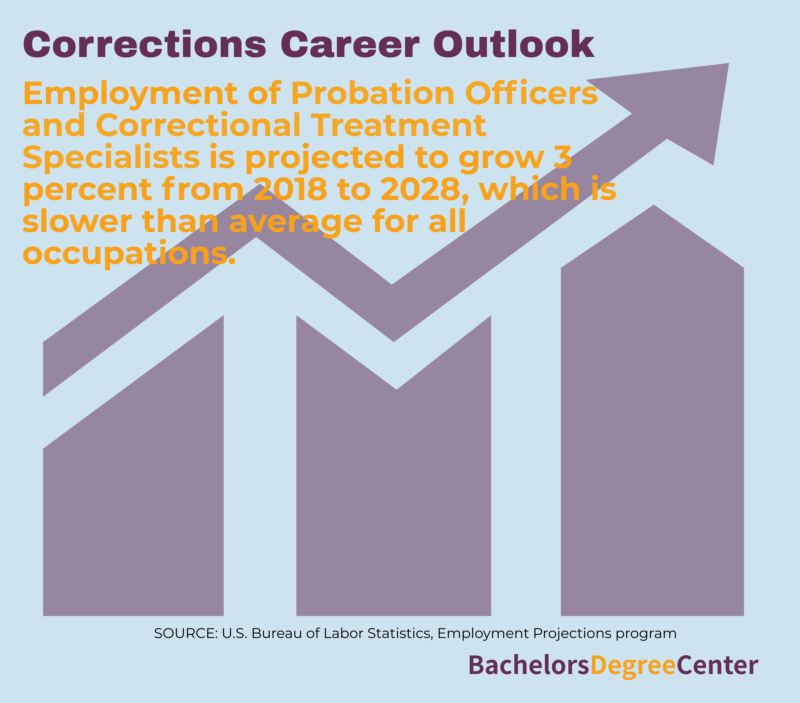
Types of Corrections Degrees
Corrections degrees are available from different organizations around the world. Although a degree in corrections can be earned on campus, an online degree in corrections has grown in popularity. With a bachelors in corrections, the graduate is positioned for a supervisory role within a penitentiary. A criminal justice corrections degree also puts a job candidate to the top of the pile when applying for open jobs as an officer. Penitentiaries prefer job candidates who already have a thorough knowledgebase of the criminal justice system. Although the correctional officer may have to attend a law enforcement academy upon hire for three to six months, the facility may show preference to bachelor degree holders.
One option available to those interested in corrections is an online degree in corrections. With this type of program, corrections is available as a pre-determined concentration. Along with core courses, the student will delve into specific courses related to the field of corrections. Courses may include sociology, criminal psychology, foundations of the law, criminal justice research methods, and foundations of corrections. Advanced corrections topics are studied during the student’s third and fourth year of full-time study. An internship program could be offered that allows the student to spend time working at a juvenile or adult penitentiary.
A corrections officer degree is also available as a standalone program. An online college could offer a Bachelor of Science in Corrections. Foundation courses will be offered through the program with liberal arts requirements. Corrections classes are normally focused on rehabilitation, prison security, legal aspect of offender treatment, and daily operations within the prison system. Online degrees are usually 100 percent done virtually. In rare cases, a college could require a minimal campus commitment.
A final option for corrections degrees is to choose corrections as a minor. When corrections is a minor option, the student usually chooses either criminal justice or criminology as a major. Criminal justice degrees provide an overview of the legal system while criminology delves into the psychology of crimes. For a minor, the student may need to complete at least five classes directly related to corrections and the prison system.
Since the student is pursuing a bachelor’s degree in corrections, 120 credits are needed for graduation. At a traditional college, most students attend for four years to earn their bachelor degrees. However, online corrections degrees are typically accelerated. Courses are offered every 10 to 12 weeks with work being scheduled at convenient times of the day. If the student is already employed, he or she could take the classes at convenient times during the day, evening, or weekend. Online corrections degrees are available on a part-time or full-time basis and can usually be finished in two to four years of study. Master degree programs are available for the corrections field and are usually pursued by those who are already in an administrative role and wish to advance even further. For instance, prison wardens will have a background in corrections and could have a master’s degree in the discipline. The prison warden may also have a dual degree in criminology and corrections.
Associate’s degrees are offered for corrections and criminal justice with credits usually transferrable if a bachelor degree is pursued.
Certifications and Licenses for Corrections Professionals
Once a degree in corrections is earned, the graduate can enhance their resume by pursuing a corrections certificate program. Online corrections certificate programs aid the individual with earning any training credits required by his or her employer. A corrections certification program is less broad than courses within a bachelors in corrections. The program is limited to usually a single topic that helps advance the training of a corrections officer.
The American Correctional Association provides numerous types of online corrections certificate programs. There are four main types of certifications available through the organization:
- Adult
- Juvenile
- Health Care
- Provisional
Furthermore, within each of these categories, there are multiple certification options. For instance, Adult Corrections has certifications for officers, supervisors, managers, and executives. The individual’s experience in the field of corrections and education level determines which type of certification he or she will pursue. Certification programs are self-paced and awarded after the examination is passed and the applicant’s credentials are confirmed. For the Provisional certification, a correctional officer holds the certification for a two-year period. At the end of the two years of working within a correctional institute, the applicant applies for a corrections officer certification.
Keep in mind that some states require a certification exam to be a correctional officer. For instance, Florida has a State Officer Certification Exam is for both police officers, probation officers, and correctional officers who plan to seek employment in the state.
Another type of certification program is for those who plan to work within a specialized area of corrections. For instance, correctional officer trainers can attend a certification program provided through the American Jail Association.
Careers With a Corrections Degree
Corrections officer jobs are more varied than most students first realize. Corrections degree jobs are not exclusive to working within adult penitentiaries. As an example, the graduate could seek out a juvenile corrections officer job. Although the job duties of a correctional officer are similar for juveniles and adults, juvenile correction officer jobs require specialized training. There are more stringent regulations on how a correctional officer must treat an underage individual. Rehabilitation strategies are also different within a juvenile setting. One potential career to look into is juvenile corrections counselor jobs. In this position, the counselor helps the juvenile overcome any problems that led to past criminal behavior.
Correctional officer job duties in an adult penitentiary include keeping order within a prison and enforcing any rules that have been set by the institution. Correctional officers must supervise inmates and intervene when needed. Searches are performed on inmates and cells to check for any illegal contraband. The correctional officer job may also ask that reports are generated on the behavior of the inmates. Correctional officers also assist with transportation of inmates to a different facility.
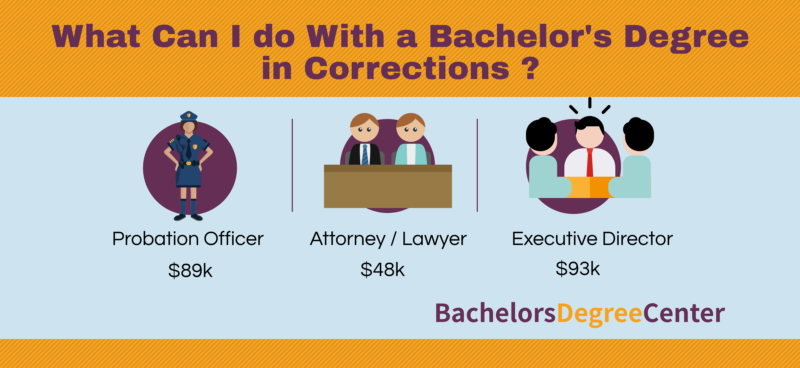
A common question is, “Do you need a degree to be a corrections officer?” Although an entry-level position as a corrections officer may only require a certification exam, corrections management positions are likely to ask for a degree in corrections or similar course of study.
A correctional case manager is also known as a correctional treatment specialist. Case managers usually work behind the scenes to evaluate programs available within a penitentiary and implement new programs to assist inmates. Correctional case manager jobs involve evaluating each prisoner to assess their strengths and weaknesses. The treatment specialist looks for strategies to help reintroduce the inmate successfully back into society.
Another type of career in corrections is to pursue a job as a parole officer. Parole officers work with inmates prior to release as a way to set a plan on how they will gain employment and become productive members of society. The parole officer also assists with arranging mental health or substance abuse support services following the inmate’s release. Upon release, the parole officer checks on the released convict routinely and may conduct drug screenings. Home visits may also be conducted to confirm that the former inmate is following all conditions of his or her release.
Corrections jobs also include correctional officer supervisors. Supervisors work within an adult or juvenile facility. The supervisors coordinate other correctional officers and ensures the employees meet all training requirements. The supervisor could also be in charge of scheduling and handling any internal issues with officers. Supervisors usually work in an environment where they interact with both fellow officers and inmates. A corrections officer manager is usually a position that’s superior to a corrections officer supervisor. The manager oversees the supervisors and usually has limited interactions with inmates. Correctional officer managers develop policies for the inmates and officers to follow. They train supervisors on these policies and evaluate any flaws found within the system. Supervisor and management jobs at juvenile facilities focus on enacting strategies that are effective within a juvenile justice setting.
Prison warden is the highest position that a person can hold while working at a correctional facility. Prison wardens are responsible for the operations of the penitentiary. The warden must be trained on crisis response techniques and how to prevent situations from escalating into riots.
After gaining experience within the field of corrections, the degree holder could seek other opportunities outside of the prison system. For instance, there are corrections degree jobs in the field of education. Correctional officer trainers are responsible for educating current and prospective officers who work in the criminal justice system.
Salary Expectations in Corrections
The salary of a corrections officer is around $45,300, according to the United States Bureau of Labor Statistics. This figure is for entry-level correctional officers with a high school degree or equivalent. Bailiffs earn a similar salary and ensure the safety of those who are inside a courtroom. A bachelor degree could increase starting salaries of a correctional officer.
Correctional officer salary varies from state to state. The annual mean wage in certain states for corrections officers are much higher than the national average. Highest wage earners for corrections officers reside in California, New Jersey, Rhode Island, Massachusetts, and New York. In these states, the average correctional officer salary is $68,000 per year or more. Locations that have state or federal prisons within their jurisdictions also provide higher annual mean wages for correctional officers. San Francisco, New York, Bakersfield, and Sacramento pay corrections officers in excess of $71,000 per year.
Corrections case manager salary is around $52,000 per year on average. Case managers take on an administrative role and may have started out as corrections officers. Supervisors within a correctional facility will earn a similar salary in the range of $52,000 to $55,000 per year.
Prison warden salaries are very competitive and usually start at $80,000 per year. At some prisons, the warden makes $115,000 or more annually.
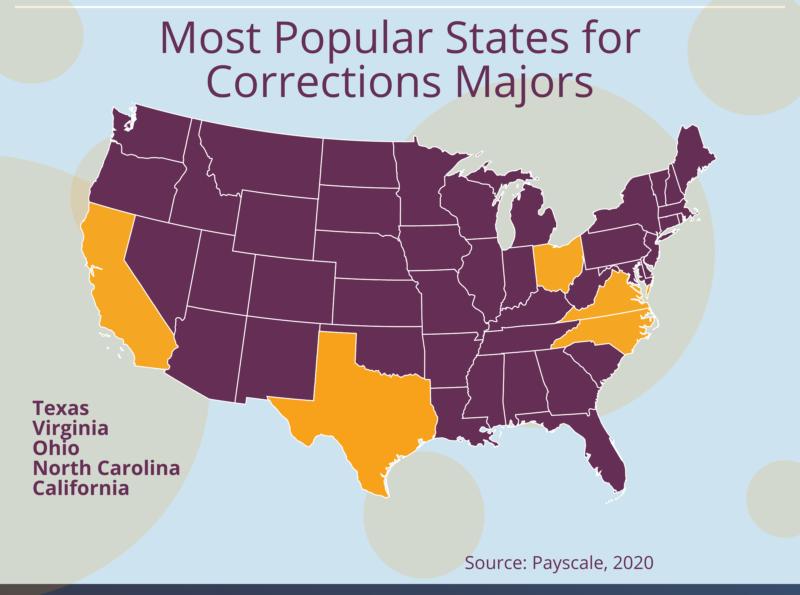
Professional Organizations
Professional organizations are very useful for those who work in corrections. For one, a professional organization puts the officer in touch with others who work in the field. When searching for a new job, attend events held by the professional organization as a way to network with current officers, supervisors, and wardens. When enrolling in a professional organization, the group provides publications that are related to the field of corrections. These publications help the officer stay on top of any new regulations within the prison system. Most importantly, the professional societies are sources for new training opportunities. Members are given access to courses that help them get certified within a specialized area of corrections. Certifications qualify the applicant for advanced positions.
The following are organizations that officers and supervisors in the corrections field should consider:
- American Correctional Association
- Correctional Leaders Association
- Association of State Correctional Administrators
Related Rankings:
25 Best Bachelor’s in Corrections
15 Best Online Bachelor’s in Corrections
